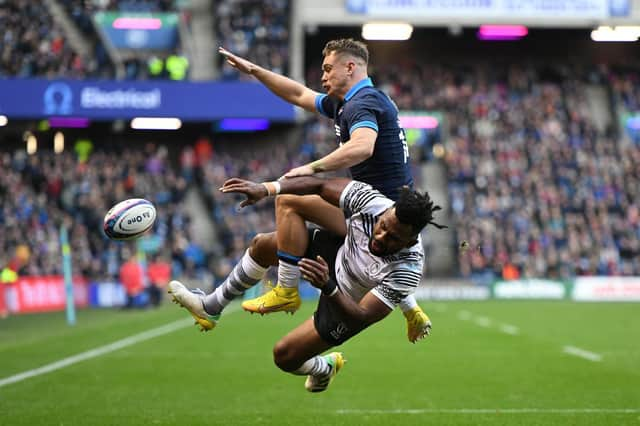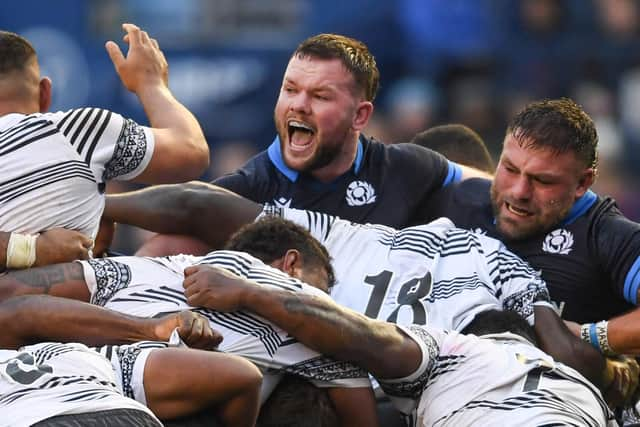Doddie Weir to return to Murrayfield for Scotland v New Zealand as Townsend speaks of ‘100 years of unfinished business’


It was the early days of Gregor Townsend’s reign and anything seemed possible. Scotland played with courage and skill that night and Stuart Hogg looked set for a score-levelling try in the final seconds only for the full-back to be brilliantly tackled by Beauden Barrett.
Hogg had played outstandingly on what was a special occasion in more ways than one. There was high emotion before kick-off when Doddie Weir and his three sons brought out the match ball and the crowd rose as one to celebrate the former lock. Weir’s battle with motor neurone disease goes on, as does his determination to raise awareness and fund research. Townsend revealed that his former international team-mate will be at Murrayfield this Saturday when Scotland face the All Blacks for the first time since the 2017 game.
Advertisement
Hide AdAdvertisement
Hide Ad“That was a special occasion, not for the game so much but what that night meant to Scottish rugby with Doddie,” said the Scotland coach. “It is five years on and Doddie is going to be there at the weekend and that is something I am sure everyone will want to recognise, acknowledge and on what he has done since he launched his foundation.
“We have to create a special occasion again on the field. I believe that in the 2017 game we didn’t have the level of confidence in the first half to win that game. We were playing brilliant rugby in the first half and it was three all. We should have scored more points in the first half. We were chasing after it in the last 10 or 15 minutes of the game and we almost won, but it's a reminder that we have to take opportunities when we are playing really well and we are playing against one of the best teams.”
Asked if there was unfinished business against New Zealand, Townsend said pointedly: “There is 100 years of unfinished business.”
The 22-17 defeat in 2017 was the closest Scotland had come to beating the All Blacks since the 25-25 draw in Edinburgh in 1983. There was little in Saturday’s 28-12 win over Fiji to suggest Townsend’s side could spring a surprise this time around but as Vern Cotter noted afterwards, “it’s a game of rugby, anything can happen these days so you just don’t know.”
New Zealand lost four times during the summer - unthinkable in 2017 when they were the world champions - but their 55-23 thrashing of Wales in Cardiff on Saturday was ominous. Townsend knows Scotland will have to show a huge improvement and he revealed there had been some frank exchanges in the changing room at the interval after a ragged first half against Fiji.


“We had to be honest,” said the coach. “We had to let them know that if it continued then we were going to lose the game. If it continued, players would be subbed for that reason. It was things in our control that were leading to massive opportunities for Fiji. We had to put an end to it, and the players did. The penalty count swung the other way and we had a bit of frustration that we didn't score a couple more tries when we had all those penalties. But we came back and got a win that sets us up for a very important week.”
Adam Hastings’ converted try just before half-time came as a blessed relief for the Scots and allowed them to go in at the break 14-12 ahead, a lead they didn’t deserve. Fiji had the worst possible start, losing lock Ratu Leone Rotuisolia to a yellow card after 80 seconds and then conceding a try to George Turner from a lineout maul five minutes later, but they came thundering back and tries from Seta Tuicuvu and Rotuisolia turned the game on its head.
The Scots were piling up the penalties, so much so that Stuart Hogg was sin-binned, but Hastings’ smart dummy and try gave them some respite and they turned the game around in the second half, scoring 14 unanswered points. Fiji’s discipline disintegrated and they conceded 13 of their 18 penalties in the second period and picked up two more yellow cards, for Vinaya Hambosi and Livai Natave.
Advertisement
Hide AdAdvertisement
Hide AdTownsend felt Scotland’s dominance after the interval should have have yielded more than converted tries from Duhan van der Merwe and Ben White. “In hindsight, maybe we should have been more direct,” said the coach, who was pleased with the impact of his players off the bench. “But the ball was a bit wet and some of our passes went as accurate and that actually played into Fiji's hands. I thought that some of our ball carrying, through Ewan Ashman, Rory Sutherland and Richie Gray, their carries were really direct. We should probably have taken them on closer to the ruck given the weather conditions. Despite that, I think a couple of tries were left out there.”


For Cotter, there was some poignancy on his return to Murrayfield five and a half years after he bowed out as Scotland coach. Fijian rugby is his concern now and he will be pleased with how quickly his side gelled after just two training sessions. Nevertheless, discipline will need to improve for next week’s trip to Dublin.
“It’s very hard to win a test match with three yellow cards,” said Cotter. “I thought the guys defended well and there were great moments in our play but we couldn’t string them all together and those patches where we were down to 14 were difficult for everybody.”
Comments
Want to join the conversation? Please or to comment on this article.
